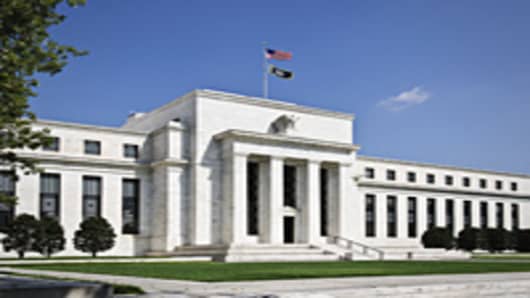While saying "it's a little bit premature to talk about tightening," Dallas Fed President Richard Fisher also believes it's time for the central bank to stand down on any more stimulus.
In an interview with CNBC, Fisher said the economy is well on its way to recovery and not in need of any more quantitative easing measures, including an extension of the ongoing Operation Twistdebt-buying measures.
The comments add to an increasing level of contradictory statements from Fed officials, who are weighing how strong the economic recovery is and what rolethe central bank should take.
"There's so much liquidity in the system," Fisher said. "Why would we add more unless we had a crisis on our hand or something was happening where we're seeing significant slippage in the economy?"
Indeed, the Fed has expanded its balance sheetto nearly $2.9 trillion and is in the midst of the $600 billion "Twist," in which the central bank is selling some of its shorter-dated securities and buying longer maturities in an effort to drive down long-term borrowing rates.
Fisher has been no fan of the program, saying the Treasury buying and ensuing low rates have come as much from a crisis of confidence in the euro as anything the Fed has done.
To that effect, he argued, the U.S. economyis in much better shape than many of its global competitors and should have the opportunity to run on its own — though he stopped well short of advocating that the Fed normalize monetary policy and begin raising interest rates.
"Our businesses are poised to take off," he said. "They're lean, they've got enormous productivity, they've cut their costs to the bone...We're in awfully good shape, and we're in much better shape, I would argue, than our counterparts overseas."
Inflation hawks, though, are arguing that the Fed needs to begin backing off its zero-interest-rate policy, which they believe will spark inflation the likes of what is being seen in surging gasoline prices.
But Fisher defended the Fed's role, saying its recent decision to define a specific long-term inflation target of 2 percent was a landmark.
As for the doves looking for more quantitative easing , he offered little support either, saying investors need to get used to a market where the Fed does not take such an active role.
"A lot of investors, quote unquote, have counted on us to provide the tailwind, rather than do the hard work that one needs to do to just basically ascertain underlying valuation," Fisher said. "I think the easy part for those that just rode on the jet stream of Federal Reserve accommodation is over now. Now they actually have to do the work, to do their analysis."




